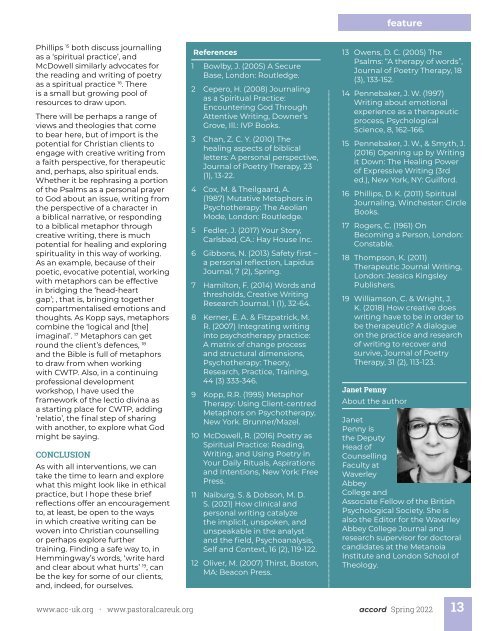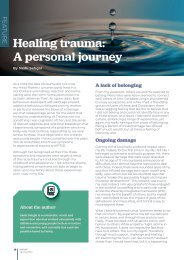Reflections on Creative Writing for Therapeutic Purposes - Janet Penny
Create successful ePaper yourself
Turn your PDF publications into a flip-book with our unique Google optimized e-Paper software.
feature<br />
Phillips 15 both discuss journalling<br />
as a ‘spiritual practice’, and<br />
McDowell similarly advocates <strong>for</strong><br />
the reading and writing of poetry<br />
as a spiritual practice 16 . There<br />
is a small but growing pool of<br />
resources to draw up<strong>on</strong>.<br />
There will be perhaps a range of<br />
views and theologies that come<br />
to bear here, but of import is the<br />
potential <strong>for</strong> Christian clients to<br />
engage with creative writing from<br />
a faith perspective, <strong>for</strong> therapeutic<br />
and, perhaps, also spiritual ends.<br />
Whether it be rephrasing a porti<strong>on</strong><br />
of the Psalms as a pers<strong>on</strong>al prayer<br />
to God about an issue, writing from<br />
the perspective of a character in<br />
a biblical narrative, or resp<strong>on</strong>ding<br />
to a biblical metaphor through<br />
creative writing, there is much<br />
potential <strong>for</strong> healing and exploring<br />
spirituality in this way of working.<br />
As an example, because of their<br />
poetic, evocative potential, working<br />
with metaphors can be effective<br />
in bridging the ‘head-heart<br />
gap’; , that is, bringing together<br />
compartmentalised emoti<strong>on</strong>s and<br />
thoughts. As Kopp says, metaphors<br />
combine the ‘logical and [the]<br />
imaginal’. 17 Metaphors can get<br />
round the client’s defences, 18<br />
and the Bible is full of metaphors<br />
to draw from when working<br />
with CWTP. Also, in a c<strong>on</strong>tinuing<br />
professi<strong>on</strong>al development<br />
workshop, I have used the<br />
framework of the lectio divina as<br />
a starting place <strong>for</strong> CWTP, adding<br />
‘relatio’, the final step of sharing<br />
with another, to explore what God<br />
might be saying.<br />
CONCLUSION<br />
As with all interventi<strong>on</strong>s, we can<br />
take the time to learn and explore<br />
what this might look like in ethical<br />
practice, but I hope these brief<br />
reflecti<strong>on</strong>s offer an encouragement<br />
to, at least, be open to the ways<br />
in which creative writing can be<br />
woven into Christian counselling<br />
or perhaps explore further<br />
training. Finding a safe way to, in<br />
Hemmingway’s words, ‘write hard<br />
and clear about what hurts’ 19 , can<br />
be the key <strong>for</strong> some of our clients,<br />
and, indeed, <strong>for</strong> ourselves.<br />
References<br />
1 Bowlby, J. (2005) A Secure<br />
Base, L<strong>on</strong>d<strong>on</strong>: Routledge.<br />
2 Cepero, H. (2008) Journaling<br />
as a Spiritual Practice:<br />
Encountering God Through<br />
Attentive <strong>Writing</strong>, Downer’s<br />
Grove, Ill.: IVP Books.<br />
3 Chan, Z. C. Y. (2010) The<br />
healing aspects of biblical<br />
letters: A pers<strong>on</strong>al perspective,<br />
Journal of Poetry Therapy, 23<br />
(1), 13-22.<br />
4 Cox, M. & Theilgaard, A.<br />
(1987) Mutative Metaphors in<br />
Psychotherapy: The Aeolian<br />
Mode, L<strong>on</strong>d<strong>on</strong>: Routledge.<br />
5 Fedler, J. (2017) Your Story,<br />
Carlsbad, CA.: Hay House Inc.<br />
6 Gibb<strong>on</strong>s, N. (2013) Safety first –<br />
a pers<strong>on</strong>al reflecti<strong>on</strong>, Lapidus<br />
Journal, 7 (2), Spring.<br />
7 Hamilt<strong>on</strong>, F. (2014) Words and<br />
thresholds, <strong>Creative</strong> <strong>Writing</strong><br />
Research Journal, 1 (1), 32-64.<br />
8 Kerner, E. A. & Fitzpatrick, M.<br />
R. (2007) Integrating writing<br />
into psychotherapy practice:<br />
A matrix of change process<br />
and structural dimensi<strong>on</strong>s,<br />
Psychotherapy: Theory,<br />
Research, Practice, Training,<br />
44 (3) 333-346.<br />
9 Kopp, R.R. (1995) Metaphor<br />
Therapy: Using Client-centred<br />
Metaphors <strong>on</strong> Psychotherapy,<br />
New York. Brunner/Mazel.<br />
10 McDowell, R. (2016) Poetry as<br />
Spiritual Practice: Reading,<br />
<strong>Writing</strong>, and Using Poetry in<br />
Your Daily Rituals, Aspirati<strong>on</strong>s<br />
and Intenti<strong>on</strong>s, New York: Free<br />
Press.<br />
11 Naiburg, S. & Dobs<strong>on</strong>, M. D.<br />
S. (2021) How clinical and<br />
pers<strong>on</strong>al writing catalyze<br />
the implicit, unspoken, and<br />
unspeakable in the analyst<br />
and the field, Psychoanalysis,<br />
Self and C<strong>on</strong>text, 16 (2), 119-122.<br />
12 Oliver, M. (2007) Thirst, Bost<strong>on</strong>,<br />
MA: Beac<strong>on</strong> Press.<br />
13 Owens, D. C. (2005) The<br />
Psalms: “A therapy of words”,<br />
Journal of Poetry Therapy, 18<br />
(3), 133-152.<br />
14 Pennebaker, J. W. (1997)<br />
<strong>Writing</strong> about emoti<strong>on</strong>al<br />
experience as a therapeutic<br />
process, Psychological<br />
Science, 8, 162–166.<br />
15 Pennebaker, J. W., & Smyth, J.<br />
(2016) Opening up by <strong>Writing</strong><br />
it Down: The Healing Power<br />
of Expressive <strong>Writing</strong> (3rd<br />
ed.), New York, NY: Guil<strong>for</strong>d.<br />
16 Phillips, D. K. (2011) Spiritual<br />
Journaling, Winchester: Circle<br />
Books.<br />
17 Rogers, C. (1961) On<br />
Becoming a Pers<strong>on</strong>, L<strong>on</strong>d<strong>on</strong>:<br />
C<strong>on</strong>stable.<br />
18 Thomps<strong>on</strong>, K. (2011)<br />
<strong>Therapeutic</strong> Journal <strong>Writing</strong>,<br />
L<strong>on</strong>d<strong>on</strong>: Jessica Kingsley<br />
Publishers.<br />
19 Williams<strong>on</strong>, C. & Wright, J.<br />
K. (2018) How creative does<br />
writing have to be in order to<br />
be therapeutic? A dialogue<br />
<strong>on</strong> the practice and research<br />
of writing to recover and<br />
survive, Journal of Poetry<br />
Therapy, 31 (2), 113-123.<br />
<strong>Janet</strong> <strong>Penny</strong><br />
About the author<br />
<strong>Janet</strong><br />
<strong>Penny</strong> is<br />
the Deputy<br />
Head of<br />
Counselling<br />
Faculty at<br />
Waverley<br />
Abbey<br />
College and<br />
Associate Fellow of the British<br />
Psychological Society. She is<br />
also the Editor <strong>for</strong> the Waverley<br />
Abbey College Journal and<br />
research supervisor <strong>for</strong> doctoral<br />
candidates at the Metanoia<br />
Institute and L<strong>on</strong>d<strong>on</strong> School of<br />
Theology.<br />
www.acc-uk.org • www.pastoralcareuk.org accord Spring 2022<br />
13



